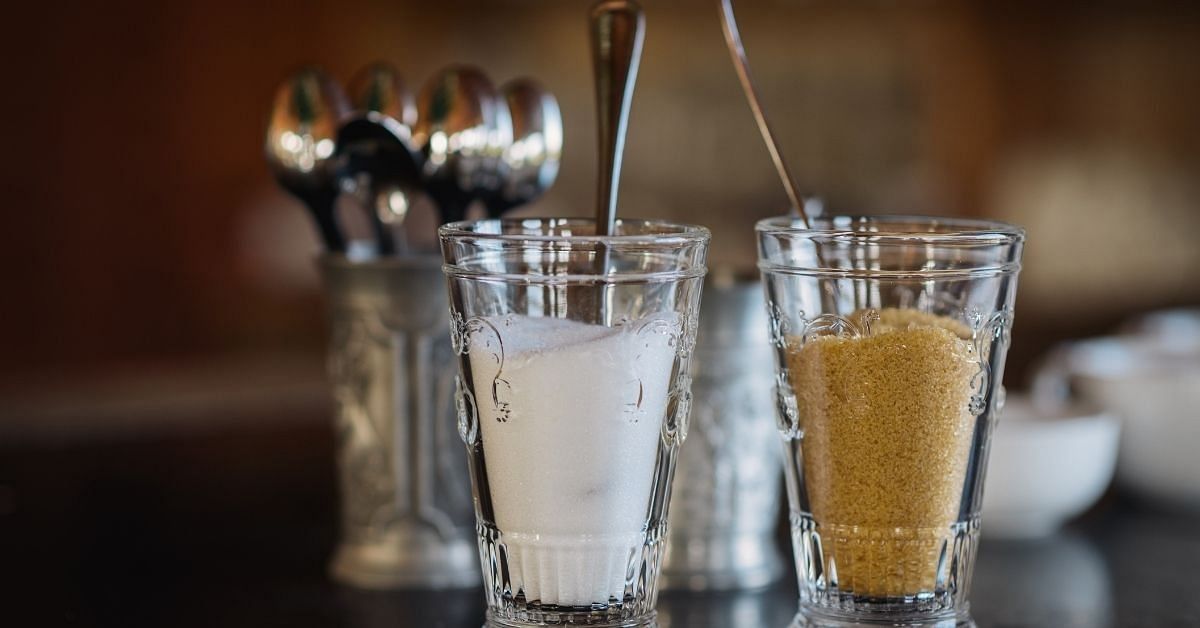Brown Sugar Vs White Sugar: Which One Is Better?
With all this bad press against white sugar, brown sugar has been taken as the hero in brown sugar vs white sugar. But is it the case? Read ahead to find out.

There has been a lot written and said about the harmful effects of consuming white sugar. Even though brown sugar may be better for you than white sugar, sugar consumption should generally be within a limit. Despite its higher nutritional content than white sugar, brown sugar may not necessarily be healthy.
Nutritional Differences - Brown Sugar Vs White Sugar
Studies show that there is little difference in calorie content between brown sugar vs white sugar. Per 100 grams (g), brown sugar has 380 calories, while white sugar has 385 calories.
There are 83 milligrams of calcium in brown sugar per 100 grams compared to 1 milligram in white sugar per 100 grams. Additionally, brown sugar contains a higher concentration of other minerals, such as iron. Furthermore, brown sugar undergoes less processing than white sugar, thereby retaining more of its natural flavour and colour.
Despite the slight differences in mineral amounts, sugar does not contain any nutrients. They are called empty calories.
According to WHO, sugars should not account for more than 10% of a person's daily calories to help reduce obesity and chronic disease risk. If a person consumes 2,000 calories a day, he or she shouldn't consume more than 200 calories from sugar, or about 12 teaspoons.
Why are the Colors Different?
The only major difference when it comes to brown sugar vs white sugar is the colour.
The colour, flavour, and moisture content of the sugar depends on molasses content. Foods with more molasses have a richer colour and flavour. The brown sugar gets its colour from molasses.
Molasses, produced from sugar cane and sugar beet, is a sweet-flavoured thick, dark brown syrup found naturally in the plants. Sugar cane molasses are sweeter than sugar beet molasses.
Sugars can be made suitable for different foods, drinks, and recipes by adjusting the crystal size and molasses content.
In the case of white sugar, manufacturers make sugar by extracting the juice from sugar beet and sugar cane plants. Raw sugar is cleaned, crystallised, and dried during the production process. In this process, molasses is lost, and so is the brown colour.
How Are They Produced?
Tropical climates are ideal for growing sugarcane or sugar beets. The process of production in brown sugar vs white sugar is different. Here is how sugar is produced.
- A brown, concentrated syrup is formed by extracting, purifying, and heating the sugary juices from both crops.
- A centrifuge is then used to create sugar crystals. (A centrifuge separates sugar crystals from molasses by spinning at an extremely fast rate.)
- Molasses is then removed from the white sugar. Smaller sugar crystals are created.
- White sugar is then put in a filtration system that often includes bone char or crushed animal bones.
- To create brown sugar, molasses are added back into white sugar to create refined brown sugar.
Also Read: Sugarcane Juice Benefits
Health Benefits and Risks of Brown Sugar
There are various pros and cons of brown sugar.
Pros:
1. Diet-Friendly
The calories of brown sugar are lower than white sugar when we talk about brown sugar vs white sugar. It is known to boost metabolism due to its molasses content. Studies have shown that supplementation of molasses leads to more calorie loss (also known as increased energy excretion).
It has also simultaneously been shown to increase energy metabolism. In addition, it contains micronutrients. Contrary to common belief, brown sugar can potentially be a better alternative to white sugar if you are on a diet.
2. Physical Exfoliation
Brown sugar can be used as an exfoliant. Using the brown crystals will rid your skin of dirt and bumps, making it smooth.
Cons:
1. Heart Palpitations
In addition to increasing your heart rate, an excessive intake of brown sugar can make you feel uneasy. A sugary meal can also make you feel bloated. Palpitations, increased thirst, fatigue, etc., are all signs of mildly high blood sugar. An irregular heartbeat can result from high blood sugar. In fact,
2. Rise in Blood Sugar Levels
It affects your blood sugar levels similarly to white sugar, even though brown sugar has fewer calories. People with diabetes should avoid this type of sugar.
3. Chronic Inflammation
Excessive consumption may lead to a rise in free fatty acid production in the liver. These fatty acids can cause inflammation when digested. Unhealthy sugar consumption can cause inflammation of the muscles and joints.
4. Bone Weakening
Studies show that brown sugar lowers bone density, making osteoporosis more likely. The regular intake of sugary meals notoriously comes with an added risk of developing fractures. Several studies have shown the absence of vital nutrients in sugary meals, worsening bone health. In a nutshell, higher rates of sugar consumption can weaken your bones by elevated glucose levels in your cells.
Health Benefits and Risks of White Sugar
Sources suggest the various pros and cons of white sugar.
Pros:-
1. Energy-packed
White sugar is a type of carbohydrate that provides the body with energy. Glucose can immediately be converted into energy and be used for various body functions.
2. Meets Glucose Requirements of the Brain
When we think, learn, and retain information, our brain consumes glucose. A regular supply of glucose is required for the brain, which is one of the most energy-demanding organs of the body. Therefore, controlled amounts of white sugar may produce better brain function.
3. Positive Psychological Effect
Sugar can produce a rush of dopamine, which activates the pleasure point of our brain, boosting our mood immediately. Psychologically, sugar boosts happiness.
4. Wound Care
White sugar paste helps deslough (the process of removing slough from a wound) rapidly when applied. As a result, tissue forms, and bacteria cannot reproduce. This is a unique advantage of white sugar when we talk of brown sugar vs white sugar.
Cons:
1. Risk of Heart Disease
White sugar is associated with higher LDL cholesterol levels when consumed in excess. Sugar and high levels of LDL accumulate on the walls of arteries and block them. This is called bad cholesterol. As a result, heart attacks or strokes are likely to occur.
2. Obesity
Diets rich in added sugars contain fructose, making people feel hungry more often, eventually leading to overeating and obesity.
3. Imbalances in Hormones
Excessive sugar intake in the body leads to an increase in blood glucose levels that trigger insulin release.
4. Insomnia
Sugar reduces sleep quality. Several nutritional therapists have indicated the evidence of insomnia from higher sugar intake. Sugar exhausts an unnatural amount of magnesium, which is a substance highly important for sleep.
Sugar can overstimulate your body if consumed late at night. A healthy adult should sleep for 6-7 hours a night. A proper sleep schedule is also vital to the body's physical regeneration, and sugar thwarts the process.
Which One Should You Choose?
Taste and colour are the main differences between white sugar and brown sugar, which you should choose based on your personal preferences. There is hardly any health benefit from brown sugar compared to teaspoon quantity, although it contains more minerals than white sugar.
However, if you must choose between brown sugar vs white sugar, it would be safer to choose brown sugar since it has added benefits, unlike white sugar.
Furthermore, sugar is the primary cause of obesity and type 2 diabetes and heart disease and other diseases, as studies suggest.
It is the primary reason why you should limit your intake of added sugar to 5–10% of your daily calories, even if one contains added benefits than the other. Optimal health, however, requires even lower levels of sugar intake. It's fine to indulge from time to time in a sugary treat, but all types of sugar should be limited.
Alternatives to Sugar
If you are interested in a healthier alternative between brown sugar vs white sugar based on their personal nutritional content, we will share some sugar substitutes. Food and beverages can be sweetened with stevia, coconut sugar, jaggery, honey, maple syrup, and similar items.
1. Stevia
Stevia rebaudiana is a plant native to Central America and South America, from where plant-based natural sweetener is extracted.
Stevia leaf extracts are becoming increasingly popular as sugar substitutes. As stevia contains no additional carbohydrates, it is an excellent choice for diabetics with sweet tooths. It does not have any calories. You can add it to whatever you like.
2. Coconut Sugar
Coconut sugar is a healthier substitute for sugar and is popular among vegans. This product is produced from the sap of the coconut palm tree and is thus minimally refined. The plants are extracted organically and made into syrup, which is then dried.
Coconut sugar contains many nutrients, such as calcium, iron, zinc, and potassium, as opposed to brown sugar, which has little nutritional value. There are 18 calories, 5 grams of carbohydrate, and 5 grams of sugar per teaspoon.
3. Jaggery
The Indian subcontinent, besides other parts of SouthEast Asia and Africa, uses jaggery, a very common and popular non-refined sweetener, made generally from sugarcane or toddy palm trees.
This contains a lot of iron, calcium, magnesium, phosphorus, and potassium. The antioxidants in jaggery or gur help reduce oxidative stress as well. It contains 15 calories and 4g of carbohydrate in 1 tsp. However, you should still avoid eating in excess.
4. Honey
The calories in honey may seem higher than sugar, as a tablespoon has 64 calories, 17 grams of carbohydrates, and 17 grams of sugar.
Adding honey to your meals can taste sweeter than sugar, so you may need less to balance things out. Additionally, honey offers other nutritional benefits that regular white sugar does not. Among these are antibacterial and anti-inflammatory properties. Iron, zinc, and potassium can also be found in them.
5. Maple Syrup
Sweetener maple syrup is made from the sap of maple trees and derived from the sap’s sugars. It originates in Canada and is considered extra sweet. Even though maple syrup has a high-calorie content, some praise its nutritional value.
The calories in a tablespoon of maple syrup are 52, the carbohydrates are 13, and the sugars are 12. Manganese is an essential mineral for bone health, and Maple syrup contains high amounts of it. It also contains iron, copper, zinc, calcium, and potassium. Additionally, recent research has shown maple syrup can help prevent Alzheimer's disease as well as lower cholesterol levels.
Summing Up on Brown Sugar Vs White Sugar
If your recipe calls for a richer flavour or more moist and chewy texture, brown sugars may be better than white sugar when comparing brown sugar vs white sugar. The high molasses content in unrefined cane sugar gives it a particularly pronounced flavour. It has a moist texture, usually coming with a toffee-like taste.
If you want to bake healthy sweet treats, you can use mashed fruit or cinnamon, or try erythritol or stevia, all healthy alternatives.
The use of sugar as energy is crucial, as sugar provides glucose. However, we sometimes consume excessive amounts of sugar in the form of invisible sugar in processed foods or fizzy drinks and visible sugar in tea/coffee.
Focusing on limiting your sugar intake and making smart switches to healthier alternatives over time for optimum health can help you stay fit.
References
- Weka Gusmiarty Abdullah, January 2015; Potency of natural sweetener: Brown sugar - https://www.researchgate.net/publication/283230120_Potency_of_natural_sweetener_Brown_sugar
- M T Henriet, J Regnard, March 1995; Increase in urinary calcium and oxalate after fructose infusion - https://pubmed.ncbi.nlm.nih.gov/7607607/
- Abdullah S Al-Goblan, December 2014; Mechanism linking diabetes mellitus and obesity - https://www.ncbi.nlm.nih.gov/labs/pmc/articles/PMC4259868/

